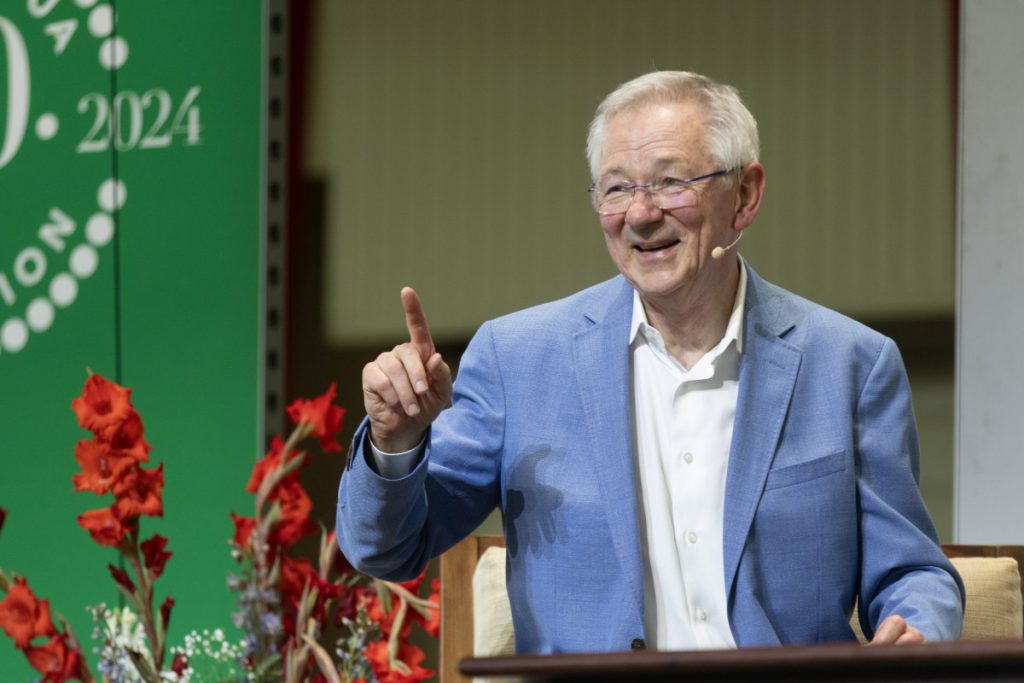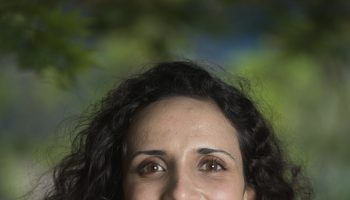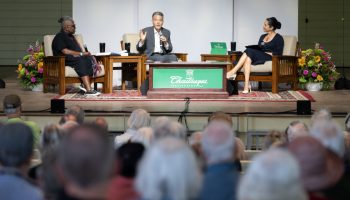
Andrew Steer, president and CEO of the Bezos Earth Fund, delivers his lecture “Can Artificial Intelligence Help Solve Climate Change and Nature Loss?” Thursday morning in the Amphitheater.
Sir Andrew Steer has a very American track record, for an Englishman.
As a young student abroad in Philadelphia, Steer was stateside for the United States of America’s bicentennial — July 4, 1976. The next day, he and his brothers embarked upon that most cherished, all-American tradition: a cross-country road trip, hitting each of the 48 contiguous states. If July 4, 1976, was inspiring, that inspiration only grew as the brothers drove.
Forty-eight years later, Steer and his wife are about to become American citizens, and on July 4, 2024, he delivered the Independence Day morning lecture in the Amphitheater, asking the question: “Can Artificial Intelligence Help Solve Climate Change and Nature Loss?”
Steer is now president and CEO of the Bezos Earth Fund; last month, the organization announced its AI for Climate and Nature Grand Challenge, a $100 million grant program to further research into how AI can be used to address climate change and nature loss.
When it comes to artificial intelligence, Steer encouraged the audience to draw on the spirit of the Founding Fathers; in 1776, “the main idea which changed everything, was this statement of 55 words only,” he said, referencing the Declaration of Independence. “It is hard to think of 55 words that humans have ever written that have had a bigger impact than this — that all people have rights, and that governments exist to serve those people, and they stand with the authority of those people — and it is so obvious that we hold these truths to be self-evident.”
The impact of those 55 words is staggering, he said. They changed everything.
World history is actually defined by such staggering, innovative changes. Controlling fire; the wheel; writing, paper, the printing press; the electric lightbulb. They all changed everything.
“People will say, ‘Is AI as important as controlling fire?’ Or, maybe, ‘Is it as important as the invention of the printing press?’ We do not know,” Steer said. “But, we know that it is pretty important.”
Technological sea changes throughout history are not without “little kinks,” he said. The inventions of watermills and windmills doubled agricultural yields in Europe.
But, “do you think the poor benefited? No, they did not,” Steer said. “Actually, they suffered as a result. Do you know who benefited? The church.”
Churches controlled one-third of all agricultural land in England, Steer explained; the reason so many Gothic cathedrals still exist is because of watermills and windmills.
The same pattern continues with the Industrial Revolution; the poor became poorer while the rich became richer.
“As we embrace new technologies, we have to think about how they are governed,” Steer said.
Technological advances have meant wonders for improving health and lifespans, and decreasing poverty. It’s a wonderful gift, Steer said, but “the problem is as we grow, which is a terrific thing to do, that growth is imposing pressures on the natural world.”
“What we have been seeing over the last 50 years as human beings have doubled in population, if you look at the populations of all of the other vertebrates combined, they have fallen by half,” he said. “One species doubles, all the other species fall by half.”
That is why climate change must be addressed; humanity has progressed a lot, but it can’t afford to not progress further.
He compared it to a dog chasing a scooter: “We are going faster and faster and inventing new things, … but the problem is going faster and faster. The dog can run faster and faster, but will never catch up unless he gets its own scooter.”
Maybe AI is that scooter, Steer said. It’s a tool, after all — just a tool — that can make things quicker, faster and more effective. This is what the Bezos Earth Fund is using the technology for.
“We can look at every single tree in the world — and there are 3 trillion of them — and every single species in the world and build predictive models, and it can develop digital twins,” Steer said. “A digital twin is a model that is based upon an incredible amount of data … (and) if you collect enough data, you can build an entire computer model and then you can try things out on it.”
Enter the Bezos Earth Fund’s AI for Climate and Nature Grand Challenge.
“We are saying to those on the front line, if you are trying to protect nature, if you are worried about river pollution, please apply,” Steer said. “We will match you up with AI experts around the world” to assist in the work.
Yes, Steer said, AI uses “an incredible amount of electricity” — by 2026, it will take 1,000 terawatts (the entire electricity consumption of Japan) to run those servers. Some worry, he said, but as Bill Gates recently noted, AI will help in the development of renewable energy. That’s not the only example of how AI can aid progress; Steer listed three other ways AI could help address nature and climate change. One way is just simply by monitoring biodiversity.
“There are 8.5 million species, possibly up to 40 million (in the world), and so far only 1.8 million have actually been described,” he said. “We are losing species more rapidly than we are identifying them.”
Through visual, sound and DNA recognition, AI can speed the pace of identifying new species and monitoring existing ones. Steer’s second example was the ways AI could influence management of the food system. The farming community has kept pace with keeping a growing population fed and nourished, but “the problem is that by 2050 we need to increase food consumption by another 50%. No longer do we have the luxury of what we have done before, which is taking more land, using more water and using more chemicals,” Steer said. “We have to think differently.”
The second-most polluting population on earth — behind humans — is livestock, which accounts for the usage of 80% of all agricultural land. Food production is also responsible for one-third of all greenhouse gas emissions.
“We are trying to reduce methane emissions — which are a very very dangerous greenhouse gas — and that means you have to do some very sophisticated science relating to the stomach of these animals,” Steer said. Vaccines and feedstocks can ameliorate those gastric emissions, and AI can, again, help expedite that research.
It can also help develop meat substitutes; more options can help shift diets.
“One of the things that AI can play a very big role on is what we call sustainable proteins — it can be plant-based, it can be fermented, it can be lab grown,” Steer said.
He admitted some of these options were less-than-appetizing.
“We have work to do,” he said. “This is a societal choice.”
Finally, Steer pointed to AI and smart electric grids. Why does this matter?
“The grid is what takes, hopefully renewable, power and delivers it — in the old days it was very simple; you had great big power plants and they distributed energy simply to houses and to factories in a one-way flow,” he said.
It’s different now; tens of millions of devices, from cars to houses, not only take electricity from the grid, but feed it back as well.
“AI can manage these massively complex systems,” Steer said, even predicting risks in faulty wiring, preventing electrical fires, shutting off and redirecting power as needed.
Steer acknowledged that yes, with AI, “the transition before us is profoundly difficult.”
“We will have to go through a transition bigger, perhaps, than human society has gone through before,” he said. “But, it is also profoundly exciting. And it is profoundly inspiring.”
Changes happen quickly — he pointed to an image of Fifth Avenue in New York City, taken in 1900. The photo only had two cars in it; all the other vehicles were horse-drawn carriages. Less than 20 years later, in another photo, taken at the same angle of the same street, there were no horses to be seen.
“That is how quickly change can take place,” Steer said.
Steer closed the solo portion of his lecture by reflecting on the “inquiring hearts and sense of faith” that exists at Chautauqua, regardless of one’s religion. It’s a sense of motivation, he said.
“One of the things I ask myself when I wake up on a Monday morning: What is it that motivates me? … It is the fact that God gave us a world and it was very good,” Steer said. “That means something.”
The First Commandment, Steer said, isn’t listed in Exodus 20; it’s at the beginning of the book of Genesis, when God says, essentially, “this is my garden; be a good steward.”
Going back to 1776 — after leading the Amp audience in a rendition of “America the Beautiful” — Steer encouraged Chautauquans to take a leaf out of the Founding Fathers’ book.
“Let’s learn from these guys,” he said. “Think boldly, think bravely, take a risk, have inspiring thoughts that will change the world.”




